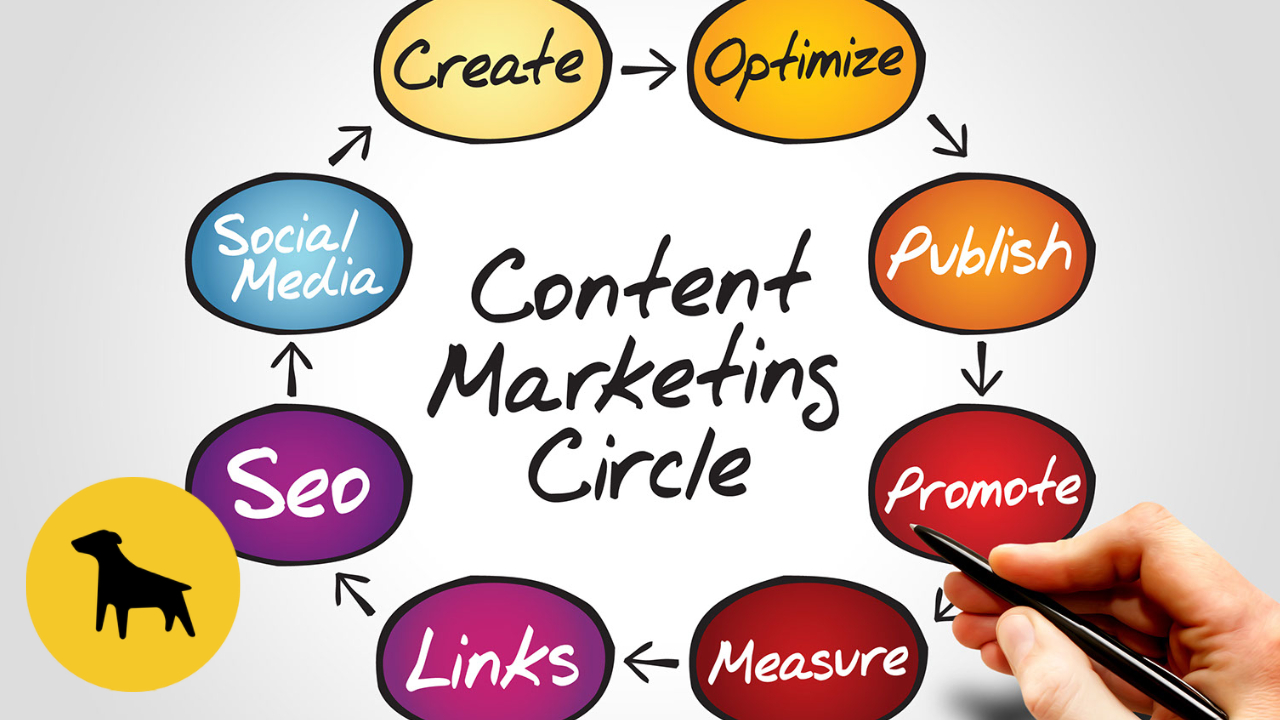Content Marketing for Beginners 2025 | The COMPLETE Guide to Content Marketing

IMMERSE YOURSELF in the exciting realm of content marketing with our all-encompassing and insightful guide: "The Ultimate Guide to Content Marketing in 2025!" As the digital world keeps changing, it's essential for businesses to stay ahead and harness the potential of content marketing to captivate, engage, and convert their ideal audience.
This guide will empower you to grasp the concept and advantages of content marketing, delve into the various types of online content, and learn to generate traffic, leads, and sales through strategic content marketing efforts. Uncover the significance of pinpointing your audience, mastering a wide range of content distribution channels, and crafting content that caters to specific stages of the buyer's journey.

Content Marketing Definition
Content marketing, at its core, is the art and science of creating and sharing valuable, relevant, and consistent content with the ultimate aim of attracting and engaging a clearly defined target audience...
It's a strategic approach that provides meaningful and engaging information to your audience to build trust, establish authority, and ultimately, inspire them to take action.
UNLIKE traditional advertising methods that focus on pushing products or services, content marketing emphasizes the importance of storytelling, nurturing relationships, and empowering your audience with knowledge. It's about fostering genuine connections and providing solutions to their problems or answering their questions, which, in turn, leads to increased brand loyalty and long-term business success.

Content Marketing Benefits for Your Business
Content marketing can be a GAME-CHANGER for your business, unlocking a multitude of benefits that can propel your growth and solidify your brand's presence in the the digital marketing space:
-
Build TRUST and CREDIBILITY with your target audience.
-
Boost your ONLINE VISIBILITY,
-
Driving more ORGANIC TRAFFIC to your website.
-
Nurture RELATIONSHIPS with your audience
-
Foster BRAND LOYALTY
-
Turn casual visitors into RAVING FANS!
-
Yield impressive returns on investment (ROI)
-
Attract and CONVERT LEADS at a relatively low cost compared to traditional advertising methods.
Bill Gates said in 1996, "Content is King." In 2023, this is more relevant than ever! If you're not creating content to market your services organically, you're getting LEFT BEHIND!
Ready to unlock the full potential of content marketing and reap the benefits for your business? Don't wait any longer! Book a FREE content marketing consultation with The Quote Dog Marketing Solutions and let our team of experts help you craft a winning strategy. Click HERE to schedule your consultation and start experiencing the power of content marketing today!

Types of Content Marketing
Diversity is key to captivating your audience and ensuring your message reaches the right people at the right time. There are several types of content marketing that can help you achieve this goal, each offering unique benefits and opportunities to engage with your target audience.
-
Blog Articles Optimized for Search Engines
Blogging is a popular and effective form of content marketing, allowing you to share in-depth insights, industry news, or helpful tips and tricks that can answer your audience's questions and address their pain points.
-
Social Media
Social Media platforms, such as Instagram, Facebook, and Twitter, provide opportunities to create visually appealing and easily shareable content that encourages interaction and conversation.
-
Video content
Video is another powerful medium, with platforms like YouTube and Vimeo enabling you to create engaging, dynamic content that can entertain, educate, or inspire your audience in a way that's hard to achieve through written content alone.
-
Podcasts
Podcasts have also emerged as a popular content marketing format, allowing you to share your message in a more personal, conversational manner that fosters a sense of connection with your audience.
-
Email Marketing
Email is a targeted, cost-effective method for directly reaching your audience, nurturing leads, and promoting products or services through personalized, timely messages.
-
Infographics, eBooks, Webinars, and Case Studies
These are other types of content that can help you showcase your expertise, provide valuable information, and demonstrate the real-world impact of your products or services.
By utilizing a mix of these content formats and types, you can cater to the preferences of your diverse audience and ensure your content marketing strategy remains fresh, engaging, and effective.

Define Your Audience and User Pathways
Defining your audience and understanding their user pathways is critical in crafting a successful content marketing strategy. Knowing EXACTLY who you're speaking to helps you create content that resonates with them on a deeper level, addressing their specific needs, interests, and pain points.
-
Develop Detailed Buyer Personas
These will outline the demographics, psychographics, and behaviors of your ideal customers. This process will provide you with valuable insights that can guide your content creation and ensure your message hits the mark every time.
-
Map Out the User Pathways
User pathways are an industry term for customer journey stages your audience goes through, from awareness to consideration, decision, and ultimately, advocacy. By understanding the different touchpoints and interactions your audience has with your brand, you can create content that not only engages them but also gently guides them along the path toward conversion.
-
Tailor Your Content to Each Stage of the Buyer's Journey
This dramatically helps you connect with your audience at the right moments, providing them with the information they need to move closer to making a purchase or taking the desired action. In short, defining your audience and user pathways allows you to create a laser-focused content marketing strategy that speaks directly to your target customers, driving engagement and fostering long-lasting relationships.

Drive Traffic, Leads, and SALES with Your Content Marketing
To effectively drive traffic, leads, and sales with your content marketing, it's vital to create content that not only attracts your target audience, but also engages and compels them to TAKE ACTION!
-
Craft HIGH-QUALITY, Valuable Content
More specifically, create content that addresses the needs and pain points of your audience, positioning your brand as a reliable source of information and solutions.
-
Optimize Your Content for Search Engines
This will improve visibility and drive organic traffic, incorporating relevant keywords and ensuring your website is user-friendly and mobile-responsive.
-
Utilize Social Media Platforms
Regularly share and promote your content, engage with your audience through comments, likes, and shares, and INCENTIVISE them to spread the word about your brand.
-
Create a Compelling Call-to-Action (CTA)
To convert leads into sales, create a compelling call-to-action (CTA) that guides your audience towards the next step, whether it's signing up for a newsletter, downloading an eBook, or making a purchase.
-
Retargeting Strategies
Additionally, consider implementing retargeting strategies to remind potential customers of your offerings and nurture them through the sales funnel.
By focusing on creating MEANINGFUL CONNECTIONS with your audience and addressing their needs at every stage of the buyer's journey, you'll be well on your way to driving consistent traffic, generating quality leads, and boosting your sales through your content marketing initiatives.

How to Provide Value Beyond Your Product Offerings
To provide value BEYOND your product offerings and truly differentiate your brand from competitors, it's ESSENTIAL to adopt a customer-centric approach that prioritizes the needs and interests of your audience.
A highly effective strategy for achieving this balance, as demonstrated by The Quote Dog's rule, is to focus on providing value 70% of the time and selling 30% of the time.
By adhering to this principle, you ensure that your content marketing genuinely resonates with your audience, offering them valuable insights, solutions, and inspiration without feeling overly sales-driven.
Even when promoting your products or services, it's CRUCIAL to emphasize the benefits and value they provide to your customers, addressing their pain points and helping them achieve their goals.
By consistently delivering high-quality, relevant content and fostering an authentic connection with your audience, you'll not only separate your brand from those that push sales aggressively but also cultivate long-lasting loyalty and trust among your customers, driving sustainable growth and success for your business.

Example of a SUCCESSFUL Blog Content Marketing
A prime example of blog content marketing can be found in a brand that consistently publishes well-researched, insightful blog posts that cater to its target audience's interests, needs, and pain points. Such a brand should leverage a mix of:
-
Educational HOW-TO Guides
-
Thought-Provoking Opinion Pieces
-
Inspiring Success Stories
All of these blog posts should be specifically designed to resonate with readers and encourage them to engage with the brand. To ensure maximum reach and impact, this brand should optimize its blog posts for search engines by doing the following:
-
Incorporate Relevant Keywords,
-
Use ATTENTION-GRABBING Headlines
-
Use Visually Appealing Images.
They should then actively promote their blog posts across social media channels, inviting their audience to join the conversation and share their thoughts. By integrating email marketing, the brand can further nurture its relationship with its audience, sending out newsletters featuring its latest blog posts, exclusive content, or special offers.
In essence, a successful blog content marketing strategy hinges on providing genuine value to your audience, fostering trust and credibility, and creating a loyal community of followers who actively engage with your brand and spread the word about your products or services.

Example of Social Media Content Marketing
An exceptional example of social media content marketing can be observed in a brand that skillfully leverages various social platforms to connect with its audience, share its story, and promote its offerings in a genuine, engaging manner. This brand should utilize platforms like:
-
Instagram
-
Facebook
-
Twitter
-
LinkedIn
-
Snapchat
This brand should use these to share a diverse range of content, including eye-catching visuals, thought-provoking quotes, informative articles, and interactive polls or quizzes. By understanding the unique characteristics and audience preferences of each platform, the brand can tailor their content to maximize its impact and encourage sharing, likes, and comments.
They should also collaborate with influencers or industry experts, tapping into their established followings to amplify their message and reach a wider audience. This is known as "Influencer Marketing."
This brand should also actively engage with its followers, responding to comments, answering questions, and nurturing relationships that foster brand loyalty and advocacy.
In essence, a successful social media content marketing strategy revolves around creating authentic, shareable content that resonates with your target audience and fosters meaningful connections, driving engagement, and promoting long-term growth for your brand.

Example of Video Content Marketing
A stellar example of video content marketing can be seen in a brand that harnesses the power of video storytelling to captivate its audience, educate them about its offerings, and inspire them to take action.
This brand might create a series of engaging videos that cover various topics, such as:
-
Tutorials
-
Product Demonstrations
-
Customer Testimonials
-
Behind-The-Scenes Glimpses
-
The Company's Culture and Values
These videos should be thoughtfully produced, featuring high-quality visuals, compelling narratives, and a clear focus on addressing the audience's needs or interests. To maximize reach and engagement, the brand would strategically distribute its videos across platforms like:
-
YouTube
-
Vimeo,
-
Social Media Channels
Make sure to optimize video titles, descriptions, and tags for search engine visibility. They should also incorporate video content into their blog posts, email marketing campaigns, or webinars, further expanding their reach and deepening their connection with their audience.
Like THIS:
Ultimately, a successful video content marketing strategy revolves around creating authentic, compelling, and shareable content that resonates with your target audience, building trust, and driving meaningful engagement with your brand.

Example of Email Marketing
An outstanding example of email marketing within the context of content marketing can be seen in a brand that strategically employs email campaigns to deliver valuable, personalized content to its subscribers, cultivating lasting relationships and driving engagement.
This brand might craft targeted email sequences that cater to different segments of their audience, taking into consideration their unique needs, preferences, and stages in the buyer's journey.
By offering exclusive content, such as in-depth articles, eBooks, or special promotions, the brand can foster a sense of connection and loyalty among its subscribers.
They may also use email to share their latest blog posts, videos, or social media updates, further extending the reach of their content marketing.
To ensure maximum effectiveness, the brand should employ:
-
COMPELLING Subject Lines
-
Engaging Visuals
-
Clear Call-to-Action (CTA's)
-
Strategies that Guide Subscribers Toward the Desired Outcome
Get your subscribers to read a blog post, watch a video, make a purchase, etc...
A successful email marketing strategy HINGES on delivering relevant, valuable content directly to your audience's inbox, nurturing relationships, and driving engagement with your brand.

How to Develop a Content Marketing Strategy
Developing a content marketing strategy that drives success and growth for your brand involves several key steps, each designed to ensure that your efforts resonate with your target audience and deliver the desired results.
-
Define Your SPECIFIC Goals and Objectives
Whether it's generating leads, increasing brand awareness, or driving sales. Having clear goals in place will help you measure your progress and make data-driven decisions throughout the campaign.
-
Understanding Your Audience
Creating detailed buyer personas that reflect their demographics, interests, and pain points. This knowledge will enable you to craft content that truly speaks to your audience and addresses their needs.
Once you have a clear understanding of your audience, research and select the most effective content types and formats for reaching them, whether it's blog posts, videos, podcasts, or social media updates.
-
Incorporate a MIX of Content Styles
Engage your audience across multiple platforms and cater to different preferences. As you create your content, focus on providing value, addressing your audience's needs, and positioning your brand as a trusted source of information.
-
Optimize your Content for Search Engines
Do this by incorporating relevant keywords, ensuring your website is user-friendly, and following best practices for on-page and off-page SEO. This will help your content rank higher in search results and drive organic traffic to your website.
-
Leverage Social Media Platforms
Use Social Media to share and promote your content, engage with your audience and encourage them to share, like, and comment.
-
Create a Content Calendar & STICK to it
Plan your content calendar, outlining when and where you will publish new content, and establish a consistent posting schedule that aligns with your audience's habits and preferences.
-
Track Your Analytics
Regularly analyze your content marketing efforts, tracking key performance indicators (KPIs) and using data to inform your strategy and make improvements where necessary.
-
Stay CONSISTENT & PATIENT
Lastly, remember that building a SUCCESSFUL content marketing strategy takes time, commitment, and a willingness to adapt and learn. By consistently delivering valuable content, engaging with your audience, and refining your approach based on data-driven insights, you'll be well on your way to establishing your brand as a leader in your industry and driving long-term success.

What Makes a Successful Content Marketing Strategy?
Determining the success of your content marketing strategy involves closely examining several key performance indicators (KPIs) that reflect your specific goals and objectives. These metrics will help you gauge the impact of your efforts and identify areas for improvement or further optimization:
-
Website Traffic:
Monitor the number of visitors arriving at your site through various channels, such as organic search, social media, and referrals. An increase in traffic indicates that your content is attracting a larger audience and piquing their interest.
-
Engagement Metrics
Evaluate the level of interaction your content generates, such as likes, shares, comments, and time spent on the page. High engagement suggests that your audience finds your content valuable and worth discussing, which strengthens your brand's credibility.
-
Conversion Rates
Track the percentage of visitors who complete desired actions, such as signing up for a newsletter, downloading an eBook, or making a purchase. Higher conversion rates signify that your content is effectively guiding users through the buyer's journey and compelling them to take action.
-
Lead Generation
Measure the number of leads generated through your content marketing efforts, such as new email subscribers or form submissions. This metric reflects your ability to capture your audience's attention and encourage them to engage further with your brand.
-
Customer Retention and Loyalty
Monitor repeat visits, customer reviews, and testimonials to assess your content's success in fostering long-term relationships with your audience. High levels of loyalty and retention indicate that your content marketing strategy is effectively nurturing trust and creating brand advocates.
-
Organic Search Rankings
Observe your content's position in search engine results pages (SERPs) for relevant keywords. Improved rankings indicate that your SEO efforts are successful and your content is more visible to potential customers.
-
Return on Investment (ROI)
Finally, calculate the ROI of your content marketing strategy by comparing the costs of producing and promoting your content with the revenue generated from your efforts. A positive ROI demonstrates that your content marketing strategy is effectively driving business results and contributing to your brand's growth.
By analyzing these metrics in tandem with your specific goals and objectives, you'll gain a comprehensive understanding of your content marketing strategy's success. Regularly reviewing this data will empower you to make informed decisions, optimize your approach, and continue to drive meaningful results for your brand.

How to Consider the Customer's Emotional Needs
Addressing your customer's emotional needs is a critical component of a successful content marketing strategy, as it enables you to forge deep connections with your audience and build trust in your brand.
To effectively consider and cater to these emotional needs, start by developing a deep understanding of your target audience, including their desires, fears, and aspirations.
SO... Let's get crackin' baby!
-
Empathize With Their Pain Points
Consider how your products or services can help alleviate their concerns or contribute to their personal growth.
-
Create Content SPECIFICALLY For Them
Craft content that speaks to their emotions, using storytelling techniques that evoke feelings of empathy, excitement, or inspiration. By telling stories that resonate with your audience on an emotional level, you'll create memorable experiences that foster loyalty and encourage your audience to engage with your brand.
-
Match Their Aesthetic Style
Incorporate visuals and multimedia elements that complement the emotional tone of your content, as images, videos, and graphics can be powerful tools for eliciting emotions and reinforcing your message. Choose colors, fonts, and design elements that align with the mood you want to evoke and the values you want to convey.
-
Keep it EMOTIONAL!
When promoting your content, use emotionally charged language in your headlines and captions, piquing your audience's curiosity and drawing them in to explore your content further.
Engage with your audience on social media platforms and in the comments section of your blog, expressing genuine interest in their thoughts and experiences. This active involvement demonstrates that you care about their emotions and value their input.
-
Stay Agile and LOOSEY GOOSEY!
Finally, continually monitor your audience's feedback and reactions to your content, adjusting your approach based on their emotional needs and preferences. By prioritizing your customer's emotional needs and crafting content that resonates on a deeper level, you'll cultivate lasting relationships with your audience and set your brand apart in a crowded marketplace.
Eager to create content that speaks to your customers' emotional needs and drives real results? Book a FREE content marketing consultation with The Quote Dog Marketing Solutions now! Our team of experts will help you craft a strategy that resonates with your audience on a deeper level, fostering loyalty and driving growth. Click HERE to reserve your spot and start making an emotional impact with your content today!

The Content Marketing Funnel
The content marketing funnel is a crucial concept that helps you understand and guide your audience through their journey with your brand, ultimately converting them from casual visitors to loyal customers. This funnel typically consists of three main stages: awareness, consideration, and conversion.
-
Awareness Stage
At this stage, the primary goals of your marketing team is to capture the attention of potential customers who may not yet be familiar with your brand or the solutions you offer. To achieve this, create content that focuses on addressing the pain points and challenges your target audience faces. High-quality, educational content like blog posts, infographics, and social media posts can help you build brand awareness and establish your expertise in your industry.
-
Consideration Stage
Once your audience is aware of your brand and recognizes the value you provide, it's time to nurture their interest and demonstrate why your products or services are the best fit for their needs.
At this stage, your content should delve deeper into the features and benefits of your offerings, as well as provide social proof through testimonials and case studies. Webinars, eBooks, and in-depth guides can help you showcase your expertise and provide valuable insights to your audience, building trust and credibility.
-
Conversion Stage
With your audience engaged and well-informed, the final stage of the content marketing funnel is focused on motivating them to take action – whether that's making a purchase, signing up for a newsletter, or requesting a consultation.
To drive conversions, create content that emphasizes the unique value proposition of your products or services and addresses any remaining objections or concerns. Product demos, personalized consultations, and exclusive offers can help you encourage your audience to take the final step and convert into customers.
Throughout each stage of the content marketing funnel, it's essential to monitor and analyze your audience's behavior and engagement. This data will enable you to optimize your online content marketing strategy, ensuring that you are effectively addressing your audience's needs at every step of their journey with your brand.
By understanding and leveraging the content marketing funnel, you'll be better equipped to create targeted, impactful content that drives results and fuels your business's growth.

How Many Pieces of Content Should I Publish Per Week?
It's time to ENRAGE the so-called "gurus..." CONTROVERSIAL Data-Driven Conclusion ALERT! When it comes to the number of content marketing pieces published per week, there's no one-size-fits-all answer!
The ideal frequency depends on various factors, such as your industry, target audience, available resources, and overall content marketing goals.
However, maintaining a consistent posting schedule is crucial for building trust and credibility with your audience while also signaling to search engines that your site is active and up-to-date.
To determine the optimal posting frequency for your brand, start by assessing your current capacity to produce high-quality content that aligns with your audience's needs and preferences. Remember, it's better to prioritize quality over quantity, as publishing engaging and valuable content less frequently can be more impactful than flooding your audience with subpar content.
Next, consider the preferences of your target audience and the platforms you're using for content distribution. Different channels may require different posting frequencies to maximize engagement and reach. For example, you might post daily on social media, while updating your blog once or twice a week, and sending out a monthly newsletter.
Monitor your content's performance, analyzing metrics such as website traffic, engagement, and conversion rates. Use this data to identify trends and patterns that can inform your posting schedule. If you notice that certain days of the week or times of day generate higher engagement, adjust your posting frequency accordingly.
Finally, don't be afraid to test and experiment with different posting schedules to find the sweet spot for your brand. Continuously evaluate and refine your approach, adapting your content marketing strategy to better serve your audience and achieve your business goals. By striking the right balance between quality and frequency, you'll optimize your content marketing efforts and maximize your impact in the ever-evolving digital landscape.

Viral Content Marketing
Viral content marketing is a powerful strategy that can skyrocket your brand's visibility and reach by tapping into the emotions and motivations of your target audience.
When content goes viral, it spreads rapidly across the internet, reaching a vast number of people in a relatively short period, often resulting in a significant boost in brand awareness, website traffic, and engagement.
But achieving virality isn't just a matter of luck; it requires a strategic approach and a deep understanding of what makes content shareable.
-
How to Create Viral Content Marketing
Begin by identifying topics that resonate with your audience on an emotional level. Content that evokes strong emotions, such as joy, surprise, or even anger, is more likely to be shared and engaged with. Pay close attention to current events, trends, and popular culture, and look for opportunities to create content that aligns with your brand's values and messaging while capturing the zeitgeist.
Storytelling is another essential ingredient for viral content. By crafting compelling narratives, you can draw your audience in and create a memorable experience that they'll be eager to share with others. Use humor, suspense, or relatable characters to make your content more engaging and share-worthy.
Visual elements, like images, videos, and infographics, can greatly enhance the shareability of your content. Eye-catching visuals not only grab attention but also help convey your message more effectively, making it easier for your audience to understand and share your content.
Optimize your content for social media platforms by using captivating headlines, hashtags, and share buttons, making it as easy as possible for your audience to spread your message. Collaborate with influencers or industry leaders to amplify your reach and increase the credibility of your content.
Finally, remember that going viral SHOULDN'T be the sole objective of your content marketing strategy. Focus on providing consistent value to your audience and building genuine connections. Virality may come as a byproduct of your commitment to creating content that truly resonates with your audience and leaves a lasting impact.
Online Content Marketing
Online content marketing is a critical component of any successful digital marketing strategy, encompassing any material you publish on the internet, with a primary focus on your web pages. The primary goal of online content marketing is to engage, inform, and inspire your target audience, ultimately leading to increased brand awareness, customer loyalty, and business growth. By crafting a strong online content marketing strategy, you'll be better positioned to rank higher in search engine results pages (SERPs) and connect with the right people at the right time.
To excel in online content marketing, start by conducting thorough keyword research to identify the terms and phrases your target audience is using to find information related to your industry or niche. By incorporating these keywords into your content in a natural and meaningful way, you'll increase your chances of appearing in relevant search results and attracting organic traffic to your website.
Next, focus on creating high-quality, relevant, and engaging content that addresses the needs, questions, and pain points of your audience. This content can take various forms, including blog posts, articles, infographics, videos, podcasts, and more. By offering valuable information and insights, you'll establish yourself as a trusted authority in your field and encourage users to share your content with their networks.
Optimize your website and content for search engines by adhering to best practices for on-page SEO, such as using descriptive title tags, meta descriptions, header tags, and including internal and external links. Additionally, ensure your website is mobile-friendly and loads quickly, as these factors can significantly impact your search engine rankings.
Promote your content across multiple channels, such as social media, email marketing, and online forums or communities, to extend its reach and increase engagement. Collaborate with influencers, industry experts, or partners to further amplify your content and tap into new audiences.
Finally, continually analyze your content's performance and adjust your strategy as needed. Track metrics like organic traffic, bounce rate, time on page, and conversions to identify areas for improvement and capitalize on your successes. By staying agile and adapting your online content marketing strategy to the ever-evolving digital landscape, you'll be poised to achieve lasting success and growth in 2023 and beyond.
Ready to elevate your content marketing game? Don't miss out on the opportunity to book a FREE content marketing consultation with The Quote Dog Marketing Solutions! Discover how our expertise can help you drive traffic, engage your audience, and boost your bottom line. Click HERE to secure your spot and start transforming your online presence today!


Leave a comment